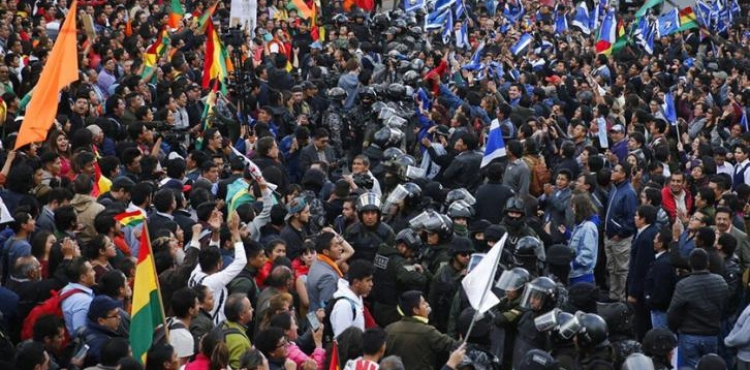Bolivia´s opposition staged a general strike Wednesday amid protests and riots to protest Sunday´s presidential election, in which President Evo Morales is likely to win a second term in the first round.
Morales told a news conference he would take measures to "defend" democracy and was confident he would be the winner without a second round.
Clashes erupted between demonstrators on Wednesday in the eastern city of Santa Cruz, a stronghold of the opposition.
Demonstrators burned at night the offices of the electoral commission in the city, and police clashed with them in La Paz and other areas.
Morales condemned the strike, which began at the invitation of the opposition and considered it a "coup", in his first public statement since the elections.
"There is a coup taking place. I want the people of Bolivia to know that. So far, with humility, we have dealt with him to avoid violence and we have not engaged in confrontations," he told a news conference.
The Organization of American States (OAS) will hold a meeting on Bolivia on Wednesday in Washington.
The strike was launched on Tuesday night by Luis Fernando Camacho, chairman of the Pro-Santa Cruz Committee, a civil society organization based in Santa Cruz, the country´s economic capital and opposition stronghold. He gave election authorities until Wednesday evening to announce a second round.
In response, a group of labor and agricultural unions close to the PA called on its activists to defend the official results and to gather in La Paz on Wednesday.
In a sign of dissatisfaction with the vote count, the vice president of the Bolivian Supreme Electoral Court announced on Tuesday his resignation, expressing his objection to the system of vote counting.
New clashes erupted on Tuesday night in the Bolivian capital of La Paz between security forces near a building where the electoral authority is based. "No, no, no, I don´t want to live in a dictatorship like Venezuela!" The protesters chanted.
Crowds burned in Sucre, the constitutional capital in the southeast of the country, and in Potosi (southwest), the seat of the local electoral court. Meanwhile, clashes with police took place in La Paz and the ruling party headquarters in Oruro was vandalized. A third electoral court was set ablaze on Tuesday night in Kobija, north of the country.
While partial preliminary results were likely on Sunday evening to organize an unprecedented second round of elections in which Morales and his opponent Carlos Mesa will compete, new results published by the Election Authority on Monday indicated that the outgoing head of state won the first round, raising doubts by the opposition and international observers of fraud.
At the same time, the parallel system of counting, the official and final counting of the minutes, came to an end.
As for the counting of votes, the Electoral Court announced at 00:00 (0400 GMT Wednesday) after counting 96.27 percent of the votes that the Socialist President received 45.98 percent of the votes, compared to 37.41 percent for Carlos Mesa, a difference of 8 , 57 points.
To avoid a second round, the winning candidate is supposed to win an absolute majority, or 40 percent of the vote, provided that the difference between him and the candidate next ten points.
Since Monday, observers from the Organization of American States (OAS) have expressed "deep concern and surprise at the radical change, which is difficult to justify about the direction of the preliminary results."
In a bid to give new guarantees of transparency, the government proposed to the OAS observers on Tuesday to form a "committee as soon as possible to scrutinize every official vote count."
"We will not recognize these results, which are part of a shameful fraud that puts Bolivian society in a tense and useless situation," Mesa, who is demanding a second round, said in Santa Cruz on Monday.
For its part, the United States rejected "the electoral court´s attempt to corrupt Bolivian democracy by delaying the counting process."
The European Union expressed "deep concern" while Spain called for "transparency" and "respect for the electoral process".












